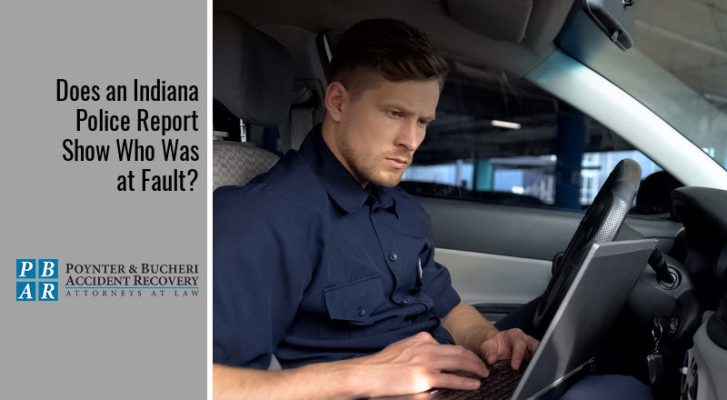
Does an Indiana Police Report Show Who Was at Fault?

What you’ll learn reading this article:
- The typical Indiana police report doesn’t always include clear information about fault.
- Fault is determined by courts and insurance companies, long after the accident happens.
- Even without a police report, you can pursue accident compensation.
You might be surprised to see what’s in the police report from your car accident – and you might be even more surprised to see what’s not in it!
Indiana police reports don’t always contain the details people expect. If you’re eager for a clear indication of who was at fault in the accident, you could be sorely disappointed when the police report isn’t as helpful as you’d hoped.
Take a close look at the police report from your accident. How detailed is it? What seems to be missing?
Contact the Indiana car accident attorneys at Poynter & Bucheri Accident Recovery for help understanding your police report. Below, we’ll explain more about crash reports and fault in Indiana car accidents.
What Information Does an Indiana Police Report Include?
The police will typically respond to an Indiana traffic accident with injuries or significant vehicle damage over $1,000. However, they aren’t required to attend every accident immediately and might prioritize other accidents over yours, especially if yours isn’t as severe.
The attending officer will fill out an Officer’s Standard Crash Report, also known as an Indiana Vehicle Crash Report if it comes from the Indiana State Police. The report contains basic identifying details about the scene of the crash and the drivers involved.
- Date
- Time
- Location
- Number of vehicles, injuries, and fatalities
- Individual drivers’ names, addresses, and driver’s license numbers
- Models and makes of vehicles
- Non-motorist involved parties (like pedestrians)
- Contributing factors
- Property damage
- Witness contact information
- General type of crash
- Diagram of the accident
- Officer’s written narrative
- Police unit and notification information
- Nature of injuries
- Testing for intoxication
- Relevant laws and citations
In the crash report, the officer can check boxes for many details about the accident. There are also sections of the report that provide larger boxes for handwritten notes and/or drawn diagrams.
You’ll probably be most interested to see what’s in the “primary cause” portion of the crash report’s “contributing factors” section. This is where the officer gives their perspective on what caused the accident to happen.
Primary causes may include:
- Alcohol or drug intoxication
- Prescription drugs
- Speeding
- Failure to yield
- Disregarding a traffic sign or signal
- Improper turns or lane changes
- Distracted driving, like using a cell phone
- Passenger distraction
- Pedestrian involvement
- Mechanical and equipment failures
- Roadway debris or construction
- Weather-related causes
- Object or animal in the roadway
- Obstructed view
Although the list above contains some of the most common accident causes, it isn’t an exhaustive list. Traffic accidents can be extremely complex and arise from unusual circumstances. The police report doesn’t always explain the full scope of what happened.
What if the Police Report Doesn’t Say Who’s at Fault?
Ideally, the officer will make an effort to capture the accident circumstances as completely and clearly as possible. An injured victim hopes the police report shows exactly who’s responsible for hurting them. However, the reality doesn’t always match this expectation.
Sometimes, the officer has trouble determining exactly what led to the crash. The officer could encounter multiple drivers arguing about what happened, plus malfunctioning traffic devices, conflicting witness statements, and/or video footage that’s unclear or difficult to access.
In some cases, the officer simply doesn’t provide much detail in the police report. They might capture the identifying information of the two drivers and little else. Now what?
Is a Police Report Required to Prove Fault?
Don’t worry too much if you don’t have a police report at all, or if your police report doesn’t contain the details you’d hoped to see. Even if the police report indicates you have some fault for the crash, it’s still possible to move forward with your Indiana car accident compensation case.
Keep in mind that a police report contains judgment calls from the officer’s point of view, after the fact. They didn’t witness your accident and don’t have the final word on your case. That’s up to the courts and the legal system.
There is no law in Indiana that states you must have a police report in order to proceed with a civil case or arrange an insurance settlement. Work with the experienced legal team at Poynter & Bucheri Accident Recovery to understand how the police report may or may not impact your case.
Poynter & Bucheri Accident Recovery – Indianapolis Personal Injury Attorneys
If you or a loved one have been injured physically or mentally by a person, product, or company, you need to know your legal rights. Our personal injury attorneys are experienced with cases like yours and can evaluate what your case may be worth. We will ensure that you are protected and compensated for your injuries and losses. Why pay up to 40% in attorney fees? Our fee is only 25%* and we fight to win your case or you pay no attorney fees at all. Don’t hesitate. One of our experienced attorneys can assist you right away. Call 1-800-265-9881 for a free case review.
